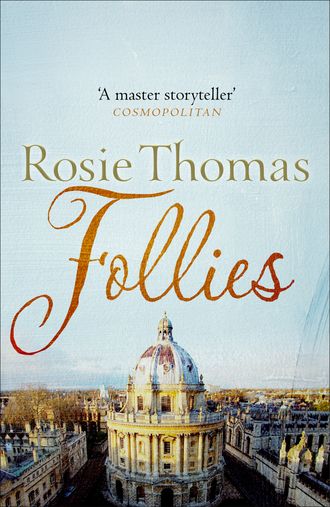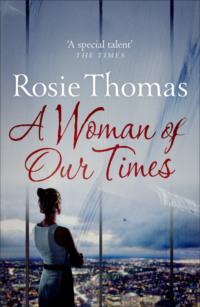
Полная версия
Follies
She found that her eyes followed him when he moved, even though she hated her own slavishness.
Pansy’s arrival seemed to have made no difference. Pansy herself gave no more of her attention to Oliver than to anyone else. She simply laughed and joked from day to day with everyone’s eyes on her, from Oliver to Gerry Pole who watched her with dog-like devotion. Whether Pansy was present or nor, Helen’s relationship with Oliver was as puzzlingly tenuous as it had been from the beginning.
But it was still there.
His arm would drop around her shoulders and pull her close to him, or he would kiss the top of her head and draw her hair up to reveal the fragile whiteness of her neck. She would turn blindly to him for a second, and then he would be gone again.
Once, a little while after the auditions, he had come to find her in her room. He had leaned against the door, smiling down at her, and from the brightness and distance in his eyes, she guessed that he had been taking drugs again. But it was unthinkable to resist when he reached for her, and pulled her down beside him on the narrow little bed.
Blindly, she pressed against him, thinking here, now, he’s with you. Nothing else matters.
Afterwards, when he lay in her arms and she was secure in his warmth, Helen studied the curves and angles of his face. She thought she saw in them the gentleness of the other Oliver, the half of himself he must feel compelled to hide for some reason that she didn’t understand.
Oliver had drifted off to sleep and Helen had gone on lying beside him, her mouth against his hair, lost in the pleasure of possession.
When he woke up again, he seemed to be listening for something in the quiet of the house.
Then he rolled away from her, his lazy, assured manner making her doubt the existence of another Oliver after all. When he was dressed he had refused her offer of a cup of tea, kissed her briefly, and gone away.
Helen had quickly learned to accept that.
He came and went as he wanted, and up until now she had seized gratefully and unquestioningly on the few times that they were together without asking for anything more.
It occurred to her that she wouldn’t have known what else to ask for, anyway.
Helen frowned. Up until the last few days, that was how it had been. But this afternoon was different. She was not simply numbed by his presence, she was hurt by it. She hadn’t seen Oliver for four days, and her need for him was growing acute. Part of the grey afternoon’s discomfort was the way her body ached for him. I was so self-controlled once, Helen remembered. Is this what sex is like for everyone? So potent as to rub out everything else, and so bitterly painful when it isn’t gratified?
The other sensation that troubled her was a dull sense of foreboding. The room was heavy with it and for a moment Helen imagined that the clouds outside the window bulged with it. Then she rejected the fancifulness of the idea with irritation. The rational Helen whose voice was still sometimes just audible told her that she was being a fool, and that she should go back to her work and forget Oliver until he appeared again. But the emotional Helen who ruled so capriciously now knew that she couldn’t do that.
She was sunk in irritable apathy, hurt and impatient and powerless to do anything. The solitude and silence pressed around her, almost tangible.
Suddenly Helen jumped up. She couldn’t bear to sit here any longer. Someone to talk to, that was what she needed.
There was no response to her knocking at Chloe’s door. Along the panelled gallery at the head of the stairs, Pansy’s door was open. Helen looked in at the jungle of record sleeves, empty cups and discarded clothes and half smiled. Pansy was always out somewhere.
Helen leaned on the carved banister and looked down into the body of the hall. The panelling seemed to absorb the light. It was numbingly quiet. Then, astonishingly, Helen heard a babble of voices. Almost at once she realised that it was a radio play. Rose must be listening in the kitchen, probably squashed into her battered armchair beside the Aga. Helen was still a little afraid of Rose, but her need for human company now was so imperative that she didn’t hesitate.
‘Come in, love,’ Rose said easily. She was indeed in the armchair, with the massive shapeless tubes of her legs propped up on a stool. ‘Sit down somewhere. Move that pile of stuff off the chair.’
Helen tried not to look at the overflowing ashtrays and smeared plates on the table. Rose lived complacently in a ripe, untidy web like a fat spider. Helen came in here rarely, and mostly in the hope of seeing Oliver. When she did meet him, it always surprised her, because he looked bored and irritable and faintly disgusted by the mess.
As she sat down Helen saw Gerry leaning against the dusty dresser behind the door. He was unshaven and his clothes were filthy. He was clutching a teacup and, as he stared at her with unfocused eyes, he lifted it and took a gulp, smacking his lips. There was a strong smell of whisky.
Helen moved uncomfortably. When she met Gerry on the stairs or along the deserted gallery, his hands invariably reached out to touch her while he joked, disconcertingly, in his cultured voice.
‘Don’t mind him,’ Rose ordered. ‘He’s having one of his bad days.’
Pansy and Chloe had joked about that. Gerry’s ‘bad days’ were the ones when he got drunk. Good days were the ones when he stayed sober, despite his failure to write a word of the non-existent novel promised to follow his single, long-ago success.
‘Tea in the pot,’ Rose told her.
As she lifted the teapot, Helen noticed that there was a crusty dribble of dried egg yolk down the side of it. She poured dark brown tea into a mug, resisting the impulse to wipe the inside of it first with her handkerchief.
‘Well, it’s not often that we see you, dear. What is it, feel like a chat?’ There was an avidity in Rose’s eyes that Helen chose not to see. Instead she nodded, grateful for the sympathy.
‘It’s my work, I suppose. I have to …’
‘Work?’ Rose’s chuckle was derisive. ‘No-one looks like you do because of work, darling. Oliver, is it? Take my advice. Give as good as you get.’
In his corner Gerry gave a short, hard laugh. ‘Always Oliver. He’s too damned lucky by half. Got the lot, he has, and acts like it isn’t worth tuppence.’ His voice was blurred and bitter, but there was a note of grudging admiration in it too. ‘If I was younger, if I could have my time over again …’
‘You aren’t. And you won’t.’ Rose interrupted him wearily.
Helen turned to watch him go and then looked away sharply. Just for an instant she had caught an echo of Oliver’s voice, and glimpsed the mint-brightness of his features distorted in Gerry’s. Surely their relationship was too distant for such a startling likeness, however fleeting?
Rose picked up a long greasy straggle of knitting and attacked it vigorously. When she spoke again, she seemed to have forgotten Oliver.
‘You may think he’s a wreck now, poor Gerry. But you should have seen him years ago. Handsome, and talented. Women fought to get at him. And he was so sure that he was going to be famous and rich. I used to be asked everywhere just because I was his half-sister. Ha, those were the days.’ She was laughing wheezily.
‘What happened?’
‘Bugger all. A little, early-flowering talent, that was Gerry. He had too much, too easy and too early, and he frittered the whole lot away. He’s been trying to get some of it back ever since.’
‘How sad,’ Helen said absently.
‘Sad? Not at all. Pathetic, perhaps.’ Rose’s voice was harsh. ‘He’s luckier than most. At least he had something, once. You know,’ she said, meditatively, as if it had just occurred to her, ‘I think perhaps Oliver’s a little like him.’
‘No, he isn’t.’ It was Helen’s turn to sound harsh now. ‘Oliver’s nothing like that.’
Rose’s white face hung expressionlessly in front of her like a pasty moon.
‘Oh, Oliver’s got money, of course. Not a lot, but enough to keep him going at the rate he spends it. Gerry never had that. And there’s Montcalm, and the title, and all that aristocratic rigmarole. But if you took all that away, you’d see the same thing in them both. Self-destructiveness.’
Helen remembered the inner, secret Oliver that she wanted so much to believe in. Perhaps his cool arrogance was to protect that. Not destructive, but protective. ‘I’m sure you’re wrong,’ she told Rose, as humbly as she could. There was a little, bitten-off smile at the corners of Rose’s mouth. ‘Perhaps. Tell me, love, are you serious about him?’
‘Yes. No. Does it matter?’
‘Only to you, love.’ Rose smoothed her knitting with an air of having finished the conversation. ‘Did you come down here hoping to find him?’
‘No,’ said Helen bleakly.
‘Because, as you see, he isn’t here. He only comes when he needs something. He’s at the rehearsal rooms. If you want him, you should go straight out and get him. Just like he’d do himself.’
Yes, thought Helen. She’s right.
Without moving or saying any more, Rose watched her leave. Then, very slowly, she shook her head and turned back to her knitting.
It was even colder outside than it had looked from her window. Helen shivered and plunged forward. She was thinking of nothing, not imagining what she would find when she reached the address that Rose had given her, except that Oliver would be there.
She was breathless when she reached the disused warehouse that was used as a rehearsal room. A blank grey door in the side wall had a rainwashed notice on it reading ‘PLAYHOUSE’. There was no bell or knocker, but the door opened when she pushed it. Inside was a little windowless lobby with a heavy steel sliding door blocking one wall. A flight of stone steps faced Helen, and as she ran up them, there was still no thought in her head except Oliver. At the top of the steps she groped in the airless darkness and then caught a breath of clearer air. Following it, she came out on to a catwalk that looked down into the main body of the warehouse.
In the middle of the bare concrete floor below her, lit by a single desk light, was a battered table covered with notes. On hard chairs drawn up to the table, Pansy and Oliver were sitting facing each other.
Helen heard Pansy’s voice first. It was soft but penetrating, filling the warehouse to the remotest corner. She was reading a scene and Oliver was following the lines, waiting for his cue.
Helen started forward to call out to them, then stopped herself. Don’t interrupt. She would let them finish the scene. She leaned back against the wall to watch, folding her arms patiently.
Oliver and Pansy were completely unaware of being watched. Pansy kept starting her speech and then stopping, trying new emphases. Oliver watched her face intently, and when Pansy looked up to meet his eyes, there was a ripple of laughter between them.
‘Perfectionist,’ Oliver murmured.
‘It will be perfect,’ Pansy whispered back. ‘It must be. When we stand up there …’
‘If you want it, then it will be.’
She was looking across at him, serious-faced. ‘What do you want, Oliver?’
The warehouse was a pool of silence. Helen’s spine crawled, icy with sudden dread.
As she watched, incapable of moving, Oliver’s hand reached out. Pansy’s was resting on the table and Oliver took it and touched each of the fingers in turn. Then he traced a circle in the palm.
‘You,’ he said simply.
The sudden, shocking clatter was his chair overturning as he stood up. Both his hands grasped Pansy’s and he lifted her from her seat to face him. Slowly, as if she was frozen, Helen’s fist went to her mouth. She bit into the clenched fingers and tried to force her eyes to close, but the scene refused to disappear. They were standing close together now, the gold head bent over the silvery one, their hands still locked together. Neither of them spoke, but their eyes explored each other’s faces, waiting.
Then Pansy smiled. It was unmistakable, both an invitation and a challenge to him. At once Oliver dropped her hands. His fingers went to her face, combing back the points of hair so that her cheeks were left exposed and vulnerable. Then, with her dazzling face cupped in his hands, his mouth moved to her. For a second they hung there, motionless, then Pansy reached to pull him closer. At once their kiss was open, hungry and self-devouring. Their two bodies were glued inseparably together.
Helen was hit by a wave of physical jealousy so naked and powerful that it almost choked her. It swept over her simultaneously with a surge of shocked self-disgust. I want him to do that to me, her body told her imperatively. I need him, and he was mine. At the same time she thought, why am I creeping and spying like this? I must get out of here. Stop humiliating myself. The realisation unlocked her frozen muscles. She wrenched her head away from the sight of Pansy stretched on tiptoe to reach Oliver’s face and stumbled back against the door to the catwalk. As she moved, her foot caught against something hollow and metallic and sent it rolling and bouncing away from her.
In the circle of light below, two heads jerked upwards.
‘Who’s there?’ Oliver’s voice was sharp, angry. In spite of the gloom, he saw her almost at once. ‘Helen? Oh, Lord. What the hell are you doing here?’
‘I’m sorry, I’m sorry,’ Helen’s voice was unnaturally high and shaky. ‘I didn’t mean … I just came to see you.’ Trembling with shock and with tight bands of panic spanning her chest, Helen groped for the door, opened it and fled. She had just had time to see Pansy staring after her, her eyes and mouth three circles of surprise and concern.
She was outside in the dreary, early dusk before she realised that someone was running after her. There was time for her to have a wild, surging hope that it was Oliver, coming to explain and to make everything all right again, before a hand gripped her shoulder and pulled her round.
It was Tom.
‘Wait,’ he said. His face was dark and angry, and his mouth was compressed into a thin line. He looked round swiftly, then guided her into the sheltering angle of a building. As she backed against it, Helen felt crumbling mortar and little cushions of moss beneath her fingers.
‘You look terrible,’ Tom told her. ‘Don’t go and … just don’t be stupid, okay? I saw it too. We were both spying, and we saw what we deserved to see. Finish. Forget it now.’
Helen struggled to focus on what he was saying. What was he doing, intruding into this?
‘I’m not stupid,’ she told him mechanically. Then the thought struck her that he must feel for Pansy as she did for Oliver. Of course Tom loved her. Even this detached, accomplished man was vulnerable to her. He must be stinging from what they had just seen as much as she was herself.
For a moment sympathy flickered in her, drawing her to Tom in spite of herself. He didn’t look angry any more. His eyes were hooded and unfathomable in the fading light, but his face had relaxed and there was even a twist of wry amusement around his mouth. He must already be thinking that their mutual exclusion was funny, Helen saw. How cool he was. Yet he was generous enough to look out for her too. Tom Hart could be a valuable friend, she remembered. And she felt that she needed one now more than she had done in all her life. He stood between her and the bleak street, like a refuge.
Then she stiffened. Tom was no refuge. His sympathy and understanding, however real, was useless to her because of his love for Pansy. That made him hers, just like Oliver. That in itself divided him from Helen like a curtain of steel.
Behind her eyes she saw the scene in the warehouse again, with Pansy’s pliant body bent like a bow against Oliver’s.
No-one could help exorcise that. All she wanted was to be alone, as far away from here as possible.
‘Come home with me,’ Tom said gently. ‘We’ll do something English, like have a cup of tea. Then perhaps we’ll follow it up with a lot of bourbon. All this is quite funny, when you come to think of it.’
Helen shook her head. His amusement, and even his kindness, suddenly grated unbearably. She gathered her strength to push past him, staring deliberately over his shoulder.
‘I’d rather be by myself. I don’t want any tea, or any bourbon.’
The sob rising in her throat made her voice sound harsher than she had intended. Tom stood back at once to let her go and she stumbled away.
His half-smile had vanished. When she had gone he picked up a pebble and threw it sharply against the angle of the wall. It clattered dismally and then rolled away into a bed of sodden leaves.
All the way back to Follies House, she held herself rigid, as if she was afraid that something inside her might split and spill, messily, in front of the strangers who were passing by.
As last she reached the house. There was no-one there, and not a sound to be heard. As she went up she counted the stairs, numbering them off in her head to stop having to think about anything else. Only when she had unlocked her door and bolted it behind her, did she feel safe enough and private enough to cry.
She stumbled to the bed and, almost gratefully, let the tears come. Helen rarely cried, but now she abandoned herself to it. The storm of weeping that overtook her was not just for Oliver, but for herself too. Disjointed images and phrases flitted through her head with the shaking sobs. She saw Oliver’s face in the firelight at the Montcalm cottage.
He was so beautiful, and so gentle then.
She remembered the exhilaration of being driven at speed in his Jaguar and the prickle of champagne in her mouth.
Nothing like him has ever happened to me before. And never will again.
The excitement she had felt at simply being close to him was still with her.
I didn’t make demands on him.
But she had not been brilliant enough to keep him.
How could I, after he’d seen Pansy?
And, again,
It isn’t fair.
Alone in the dark, Helen cried as if she could never stop. But at last no more tears would come. Still in the same position, cold and cramped, she stared unseeingly upwards and forced herself to think.
She knew that she had walked into this loss with open eyes. She remembered thinking I don’t care what happens. I just want him now. She had relished the reckless thrill that the thought had given her.
Конец ознакомительного фрагмента.
Текст предоставлен ООО «ЛитРес».
Прочитайте эту книгу целиком, купив полную легальную версию на ЛитРес.
Безопасно оплатить книгу можно банковской картой Visa, MasterCard, Maestro, со счета мобильного телефона, с платежного терминала, в салоне МТС или Связной, через PayPal, WebMoney, Яндекс.Деньги, QIWI Кошелек, бонусными картами или другим удобным Вам способом.









